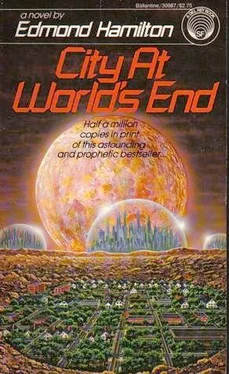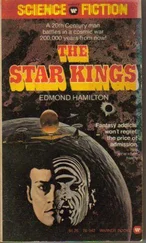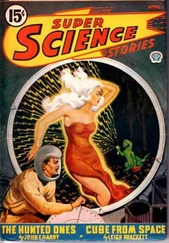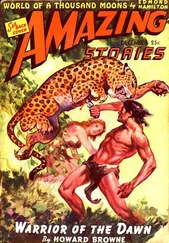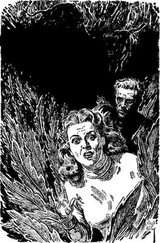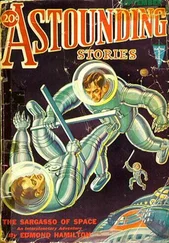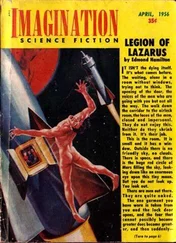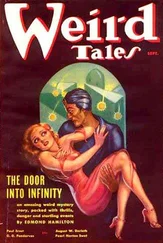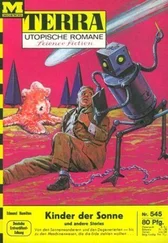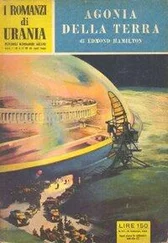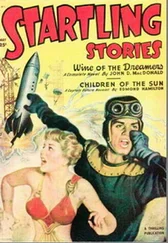“—and they say that Mrs. Biler’s feeling better now, but her husband’s still poorly—”
“Human beings,” said Hubble, “are adaptable. Thank God for that.”
“But if they’re the last? They won’t be able to adapt to that.”
Hubble shook his head. “No. I’m afraid not.”
After breakfast, Beitz led them to a big square building two blocks off the plaza. Inside was a large, shadowy hall, in which bulked a row of tall, square blocks of apparatus. They were, obviously, televisor instruments. Each had a square screen, a microphone grating, and beneath that a panel of control switches, pointer dials, and other less identifiable instruments.
Kenniston found and opened a service panel in the back of one. Brief examination of the tangled apparatus inside discouraged him badly.
“They were televisor communication instruments, yes. But the principles on which they worked are baffling. They didn’t even use vacuum tubes—they’d apparently got beyond the vacuum tube.”
“Could you start one of them transmitting again?”
Kenniston shook his head. “The video system is absolutely beyond me. No resemblance at all to our primitive television apparatus.”
Hubble asked, “Would it be possible then to use just the audio system—use one of them as a straight sound-radio transmitter?”
Kenniston hesitated. “That might be done. It’d be mostly groping in the dark. But there are some familiar bits of design—” He pondered, then said, “The power leads come from outside. See anything around here that looks like a power station?”
Old Beitz nodded. “Only a block away. Big, shielded atomic turbines of some kind, coupled to generators.”
“We might spend years trying to learn how to operate their atomic machinery,” Kenniston said.
“We could couple gasoline engines to those generators,” Hubble suggested. “It’d furnish power enough to try one of these transmitters.”
Kenniston looked at him. “To call to the other people still left on Earth?”
“Yes. If there are any of them, they’d not hear our kind of radio calls. But this is their own communication setup. They’d hear it.”
Kenniston said finally, “All right Give me power, and I’ll try.”
In the next few days, Kenniston was so immersed in the overmastering fascination of the technical problem set him, that he saw little of how Middletown’s people were adapting to New Middletown. He could hear the trucks rumbling constantly under the dome, as McLain indefatigably pushed the work of bringing supplies from the deserted town beyond the ridge.
They brought the gasoline engines needed, not only to pump water from the great reservoirs but also to turn one of the generators in the power station. Once he had power, Kenniston began to experiment. Realizing the futility of trying to fathom the principles of the strange super-radio transmitters, he tried merely to deduce the ordinary method of operating them.
The trucks brought other things—more food, clothing, furniture, hospital equipment, books. McLain began to talk of organizing a motor expedition to explore the surrounding country. And meanwhile, the crews already organized to explore New Middletown itself were searching every block and building. Already, they had made two surprising discoveries.
Hubble took Kenniston away from his work to see one of these. He led down through a chain of corridors and catacombs underneath the city.
“You know that it’s a few degrees warmer here in New Middletown than the Sun’s retained heat can account for,” Hubble said. “We found big conduits that seem to bring that slightly wanner air up into the city, so I had the men trace the conduits down to their source.”
Kenniston felt sudden excitement. “The source? A big artificial heating plant?”
“No, not that,” Hubble said. “But here we are now. Have a look for yourself.”
They had suddenly emerged onto a railed gallery in a vast underground chamber. The narrow gallery was the brink of an abysmal pit—a great, circular shaft that dropped into unplumbed blackness. Kenniston stared puzzledly. He saw that big conduits led upward out of the pit, and then diverged in all directions. “The slightly warmer air comes up from this shaft,” Hubble said, nodding toward the pit. He added, “I know it sounds impossible, to our engineering experience. But I believe this shaft goes downward many, many miles. I believe it goes down into Earth’s core.”
“But Earth’s core is incredibly hot!” Kenniston objected. “It was hot, millions of years ago,” Hubble corrected. “And as it grew cooler, as the surface grew cold, they built this domed city and maybe others like it—and sank a great shaft downward to bring up heat from the core. But Earth’s core is even cooler now, almost cold. And now there is only a trifle of heat from it to warm the city a little.”
“So that’s why they couldn’t live here any more—it was the Earth heat they depended on, and that ran out,” said Kenniston, a little hopelessly.
The second discovery was made by Jennings, a young auto salesman who headed one of the exploration crews. He brought news of it to the scientists, and Kenniston went with Beitz and Crisci to see it.
It was simply a big, semicircular meeting hall in one of the larger buildings, with tiers of several hundred seats.
“A council room, or lecture hall, maybe,” said Beitz. “But what’s unusual about it?”
“Look at those seats in the second tier,” said Jennings. They saw then what he meant. The seats in that tier were not ordinary metal chairs like the others. They were different—different from the chairs, and different from each other. Some of them hardly looked like seats at all. One row of them were very wide and flat and low, with broad backs that flared in a little inward. Another row were very narrow seats, that had no backs at all. Still others looked a little like curved lounging chairs, but the curve was an impossibly deep one.
“If they’re seats,” said Jennings, “they weren’t intended for ordinary human people to sit in.”
Kenniston and the others looked at each other, startled. He had a sudden grotesque vision of this hall crowded with an audience, an audience partly human, and partly—what? Had humanity, in the last ages, shared the Earth with other races that were not human?
“We are all jumping to conclusions.” Beitz’ voice broke the spell. “They may not be seats at all.” But he added to Jennings as they left, “Better not tell the people about this. It might upset them.”
What the other exploration crews had found was summarized in a short speech by Hubble at the big town meeting of Middletown’s people held in the plaza on Sunday afternoon.
There had been church services that morning—services without bells or organs or stained glass, but held in lofty, shadowy rooms of cathedral solemnity. The first town meeting of New Middletown followed. Loudspeakers had been set up so that all in the big plaza might hear, and Mayor Garris, an older-looking, humbled Mayor Garris, spoke to them.
He was stumblingly encouraging.
The ration system was working well, he told them. There was no danger of starvation, for hydroponic farming would soon be started.
They could live in New Middletown indefinitely, if necessary.
“Doctor Hubble,” he added, “will tell you of what has been found in New Middletown by the exploring crews.”
Hubble was concise. He emphasized first that the original inhabitants of New Middletown had apparently left it deliberately.
“They took their personal belongings, their books, their clothing, their smaller apparatus, instruments, and furnishings. What they left were things too massive for easy transportation. That includes certain machinery which we think was atomically powered, but which must be studied with great care before attempts at operation can be made. We feel sure that in time, study will make it possible to use all such equipment.”
Читать дальше
